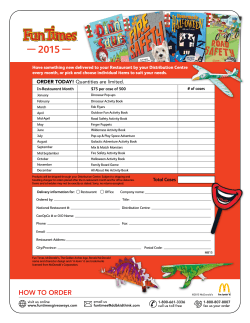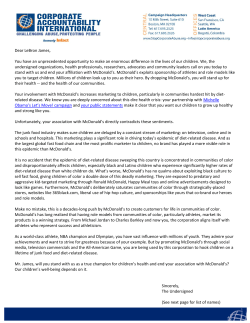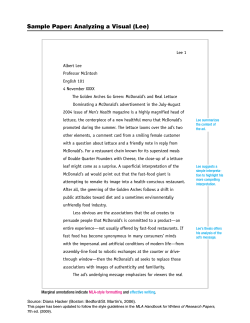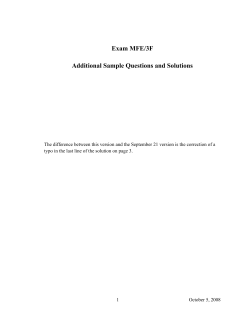
Franchising at McDonald’s From small beginnings
Franchising at McDonald’s Stock Control Franchising Marketing Construction Careers Franchising Finance Marketing at McDonald’s Training Glossary I.T. Customer Services Education Customer Services Stock Control Franchising Marketing Talking Point Apprenticeships Marketing Franchising Marketing Finance Training Stock Control Glossary Franchising Education Stock Control Customer Services Finance Finance Glossary When brothers Mac and Dick McDonald opened their first restaurant in 1940 in San Bernardino, California, they could never have imagined the phenomenal growth that their company would enjoy. From extremely modest beginnings, they hit on a winning formula of selling high quality food cheaply and quickly. However, it was not until Ray Kroc - a Chicago based salesman with a flair for marketing - became involved, that the business really started to grow. I.T. There are now more than 30,000 McDonald’s restaurants Franchising in over 119 countries and territories, serving nearly 50 million people each day. In 2006, McDonald’s global sales Stock Control were over $57 billion, making it by far the largest food service company in the world. In 1955, Ray Kroc realised Recruitment & Training that the key to success was rapid expansion. The best way to achieve this was through offering franchises. Today, over Customer Services Talking Point 70% of McDonald’s Apprenticeshipsrestaurants are run on this basis. In the UK, the first restaurant opened in 1974 and the first franchised restaurant opened in 1986. There are now over 1,190 restaurants, employing more than 70,000 people, of which 51% are operated by franchisees. Finance Training Construction Construction From Construction small beginnings Training Glossary I.T. Marketing Customer Services Construction Talking Point Franchising Talking Point Marketing Apprenticeships Construction Stock Control Franchising Marketing Training Glossary I.T. Training Glossary I.T. Finance Training Glossary Education Customer Services Talking Point Apprenticeships Education Customer Services Talking Point Apprenticeships Education I.T. Customer Services Talking Point Apprenticeships Construction I.T. Apprenticeships A McDonald’s Franchise: what does this mean? McDonald’s is an example of brand franchising. McDonald’s, the franchisor, grants the right to sell McDonald’s branded goods to someone wishing to set up their own business, the franchisee. Under a McDonald’s franchise, McDonald’s owns and leases the site and the restaurant building. The franchisee buys the fittings, the equipment and the right to operate the franchise for 20 years. To ensure uniformity throughout the world, all franchisees must use standardised McDonald’s branding, menus, design layouts and administration systems. The licence agreement also insists the franchisee uses the same manufacturing or operating methods and maintains the quality of the menu items. Franchising at McDonald’s Page Franchisingpeople become Marketing a McDonald’s Construction Why Franchisee • They want to be their own boss The franchisee is provided with training and support from McDonald’s, but is effectively running his or her own business. They fund the franchise themselves and therefore have much to lose as well as gain. This makes them highly motivated and determined to succeed. Training I.T. The franchisee assumes Glossary the responsibility of operating their restaurant in accordance with McDonald’s standards of quality, service and cleanliness. As part of the agreement, McDonald’s regularly checks the quality of each franchise’s output, and failure to maintain standards could threaten the franchisee’s licence. Ray Kroc believed strongly that a business must be prepared to Customer put something back into the community Apprenticeships in which it Services Talking Point operates. Each franchisee is therefore expected to become involved in local events and charities. • Selling a well established, high quality product A large proportion of new businesses and new products fail due to the costs of the research and development needed to develop their product or service. Ray Kroc’s insistence that all McDonald’s outlets sell the same food items and achieve the same quality has led to a standardisation of the procedures and great attention to detail with a great level of success. The cooking stages in McDonald’s restaurants are broken down into small, repetitive tasks, enabling the staff to become highly efficient and adept. This division of labour and the high volume turnover of a limited menu allows for considerable economies of scale. For the franchisee, this can considerably reduce the risk of setting up their own business. There is no need to develop a product, invest in expensive market research, or worry if the product will appeal to the consumer. McDonald’s has already made the investment and carries out regular market research on the business. Franchising at McDonald’s Page • Excellent Franchising training Marketing Construction Every franchisee has to complete a full-time training programme, which they must fund and which lasts about nine months. This training is essential and begins with working in a restaurant, wearing the staff uniform and learning everything from cooking and preparing food to serving customers and cleaning. Training Customer Services Glossary Talking Point Further training at regional training centres focuses on areas such as business management, leadership skills, team building and handling customer I.T. enquiries. The franchisees will have to recruit, train and motivate their workforce, so they must learn the skills of human resource management. During the final period, they learn about stock control and ordering, profit and loss accounts and the legal side of hiring and employing staff. Consequently, no Apprenticeships McDonald’s franchisee would have to ask a member of his or her staff to do something that they couldn’t do themselves. Knowing this can also be a powerful motivator for the staff. • Continuous support McDonald’s commitment to its franchisees does not end with the training. It recognises that the success and profitability of McDonald’s is inextricably linked to the success of the franchises. A highly qualified team of professional consultants offers continuous support on everything from human resources to accounting and IT business controls. These field consultants can become valued business partners and are a sounding board for ideas. • Benefit from national marketing carried out by McDonald’s A brand is a name, term, sign, symbol or design - or a combination of these - which identifies one organisation’s products from those of its competitors. The phenomenal growth of McDonald’s is largely attributed to the creation of its strong brand identity. McDonald’s trademark, the Golden Arches, along with its brand name, has become amongst the most instantly recognised symbols in the world. In the UK, McDonald’s recognised the need for a co-ordinated marketing policy. In order to be successful, an organisation must find out what its customers want; develop products to satisfy them; charge them the right price; and make the existence of the products known through promotion. TV, radio, cinema and online advertising have played a major part in the McDonald’s marketing mix. Franchising at McDonald’s Page Some advertisements are used to convey specific messages, Franchising Marketing Construction for example emphasising McDonald’s quality ingredients. Promotional activities, especially within the restaurants, have a tactical role to play in getting people to return regularly. All franchisees benefit from any national marketing and contribute to its cost, currently a fee of 4.54% of sales. The franchisees additionally benefit from the extensive national market research programmes that assess consumer attitudes and perceptions. What do they want to buy and at Glossary I.T. what Training price? How is the company performing compared to its competitors? Any new products are given rigorous market testing so that the franchisee will have a reasonable idea of its potential before it is added to the menu. Introducing new menu items which have already been researched and tested, considerably reduces the risk to the franchisee of changing their menu. Customer Services Talkingis Point Investment in sponsorship also a central Apprenticeships part of the imagebuilding process and increases awareness of a brand. For example, McDonald’s partnership with the four national footballing associations created 10,000 new, quality football coaches in communities across the UK. McDonald’s still follow Ray Kroc’s community beliefs today, globally supporting a range of community activities and charities, including RMHC which provides home-away-fromhome accommodation for the families of children being treated for long-term illness. • They receive access to business forecast information Another major problem for a new business is predicting the sales it may have. This affects cash flow and can create problems or produce difficulties associated with overtrading. The turnover and profit from any outlet will vary depending on a wide range of internal and external variables. Each franchisee is expected to take a positive approach to building up sales, although an average rate of return of over 20% is generally expected over the lifetime of the franchise. Franchising at McDonald’s Page Franchising Marketing Construction THE ADVANTAGES FOR THE FRANCHISOR McDonald’s recognises the benefits of a franchised operation. Franchises bring entrepreneurs full of determination and ideas to the organisation. Franchising enables McDonald’s to enjoy considerably faster growth and the creation of a truly global brand identity. The more restaurants there are, the more McDonald’s can benefit from economies of scale. Training Customer Services Glossary Talking Point On the financial side, McDonald’s receives a monthly rent which is calculated on a sliding scale based on the I.T. restaurant’s sales, i.e. the higher the sales, the higher the percentage and vice versa. There is also a service fee of 5% of sales that is contributed to support department activities and royalties. The purchase price of a restaurant is generally about £150,000 upwards. The new franchisee is expected to fund a minimum of 25% of this from their own unencumbered funds. Apprenticeships DYNAMIC INNOVATION Whilst the franchisees have to agree to operate their restaurants in the McDonald’s way, there still remains some scope for innovation. Many ideas for new items on the menu come from the franchisees responding to customer demand. Developing new menu items is crucial to any business, even one which has successfully relied on a limited menu for many years. Consumer tastes change over time and a company needs to respond to these changes. Innovation injects dynamism and allows the firm to exploit markets previously overlooked or ignored. The introduction of the Egg McMuffin in 1971, for example, enabled McDonald’s to cater initially for the breakfast trade. Filet-o-Fish, Drive-thrus and Playlands were all menu items or concepts developed by franchisees. THE THREE-LEGGED STOOL A third group of stakeholders, critical to the success of the franchise operation, is the suppliers. As McDonald’s considers quality to be of absolute importance, it sets standards for suppliers that are amongst the highest in the food industry. McDonald’s believes in developing close relationships with suppliers – everything is done on an open accounting, handshake trust basis. The suppliers work closely with McDonald’s to develop and improve menu items and production techniques. This close interdependency is described as a three-legged stool principle, and involves McDonald’s, the franchisees and the suppliers. Suppliers who are able to meet the quality standards set down by McDonald’s have been able to share in the growth and success of McDonald’s. hising ing r Services hising ing r Services Franchising at McDonald’s Page Franchising CONCLUSION Marketing Construction McDonald’s views the relationship between franchisor, franchisee and supplier as paramount to the success of the business. Ray Kroc recognised the need very early on for franchisees who would dedicate themselves to their restaurants. He wanted people who had to give up another job to take on the franchise venture, who relied on their franchise as their sole source of income and would therefore be highly motivated and dedicated. Consequently, McDonald’s will not offer franchises to Training Glossary partnerships, consortia or absentee investors. I.T. The initial capital has to come from the franchisee as a guarantee of their commitment and a rigorous selection process ensures that McDonald’s only recruits the right people. Marketing Construction Glossary I.T. Talking points 1. McDonald’s is a franchisor. What rights do McDonald’s sell to the franchisee? Customer Services Talking Point Apprenticeships Talking Point Apprenticeships 2. What are the responsibilities of the franchisee? 3. What are the benefits to McDonald’s of selling franchises? 4. Why do McDonald’s insist on a licence agreement with the franchisee? 5. What support does McDonald’s provide to the franchisee? 6. Why is the support given to the franchisee vital to the success of the business? 7. How do the suppliers to McDonald’s benefit from the sale of franchises? 8. What do you think are the personal and professional characteristics of a franchisee? Marketing Construction Glossary Glossary I.T. Brand identity: Image and values associated with a brand Cashflow: Cash coming in and going out of a business Division of labour: Breaking a job down into specific roles or parts Talking Point Apprenticeships Economies of scale: The advantages that result from being large which lead to reductions in average costs Entrepreneurs: People who use their ideas and energies to invest in a business in return for profits Franchisee: The person or company that buys the local rights to use the name, brand and image of another business Franchises: Businesses that are based upon the name, logos and trading methods of an existing organisation High volume turnover: Large amounts of sales Human resource management: The development of an organisation’s people Lease: The right to use a property or land for a limited period of time Marketing: The function that links a business’s activities with the tastes and preferences of its customers Marketing mix: Group of variables – People, Price, Product and Place, sometimes known as the four Ps, forming the basis of marketing strategy Market research: Systematic range of activities designed to find out the views and thoughts of both potential and existing users of products or services Overtrading: Expansion that damages cash flow Promotion: Making products and services better known through a range of activities Sponsorship: Element of the promotional mix that allocates funds for sporting, cultural or social events Standardisation: The use of products that are identical and so are interchangeable Trademark: Logo and symbol displayed on a company’s products Training: Education related to work ©2008 McDonald’s Corporation All trademarks are the property of McDonald’s Corporation and its affiliates.
© Copyright 2025





















